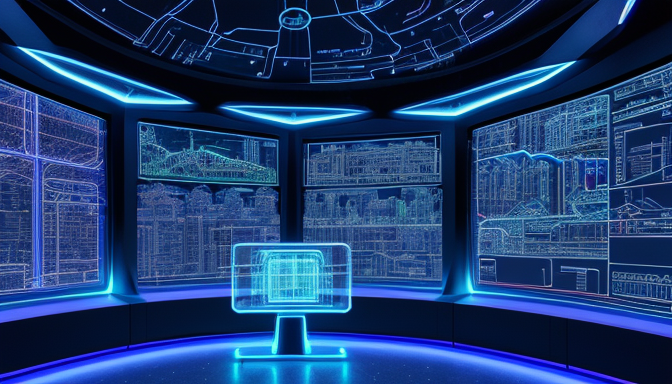The world of technology is evolving at a breakneck speed, and at the heart of this revolution is artificial intelligence (AI). As we stand on the brink of a new era, the question on everyone’s lips is: what’s next for AI? The recent advancements in AI are not just impressive; they are downright transformative. From machine learning algorithms that can predict consumer behavior to robotics that are redefining manufacturing processes, the possibilities seem endless.
Imagine a future where AI seamlessly integrates into our daily lives, making everything from healthcare to transportation more efficient and personalized. For instance, AI-driven diagnostics can analyze medical data faster than any human doctor, leading to quicker and more accurate treatments. Similarly, in finance, AI algorithms can detect fraud in real-time, protecting consumers and businesses alike. It’s like having a superpower that enhances our capabilities and opens up new avenues for innovation.
However, as we embrace these advancements, it’s crucial to stay informed and responsible. The integration of AI into our lives brings with it a host of ethical considerations. How do we ensure privacy? What about bias in AI systems? Developers hold the key to creating fair and transparent systems, and it’s a responsibility they must take seriously. As we navigate this exciting landscape, let’s keep the conversation going and explore how we can harness the power of AI for good.
Transformative Applications of AI
Artificial Intelligence is not just a buzzword; it’s a game-changer that is revolutionizing various sectors. Imagine walking into a hospital where AI systems predict your health issues before you even feel a symptom. In healthcare, AI algorithms analyze medical data with remarkable precision, enhancing diagnostics and personalizing treatment plans. This isn’t science fiction—it’s happening now!
In the finance sector, AI is like a seasoned detective, sifting through massive amounts of data to uncover patterns and trends. It helps in fraud detection, risk assessment, and even in automating trading decisions. The efficiency AI brings to financial institutions is akin to having a superhuman analyst who never sleeps!
Transportation is also undergoing a seismic shift with the advent of AI. Self-driving cars are no longer just a dream; they are on the roads, thanks to advanced AI technologies. These vehicles use machine learning to understand their environment and make real-time decisions, which can potentially reduce accidents and traffic congestion. It’s as if they have a sixth sense!
Moreover, AI is enhancing customer experiences across industries. Chatbots, powered by AI, provide 24/7 support, making interactions seamless and efficient. They can handle inquiries and solve problems faster than any human could, allowing businesses to focus on what truly matters—growth and innovation.
As we delve deeper into the transformative applications of AI, it’s clear that the future holds immense possibilities. Staying informed about these advancements is crucial, as they will shape the world we live in. Are you ready to embrace the future?

Ethical Considerations in AI Development
As we stand on the brink of a technological revolution, the ethical considerations surrounding artificial intelligence (AI) are more crucial than ever. With AI systems becoming integral to our daily lives, from healthcare to finance, it’s vital to address the potential pitfalls. Have you ever wondered who is responsible when an AI makes a mistake? This question highlights the need for developers to create fair and transparent systems.
One of the most pressing concerns is bias in AI algorithms. If an AI system is trained on biased data, it can perpetuate stereotypes and discrimination. For instance, facial recognition technology has shown to perform poorly on individuals with darker skin tones, leading to significant ethical dilemmas. Developers must prioritize diverse datasets and implement rigorous testing to mitigate these issues.
Privacy is another major concern. With AI systems analyzing vast amounts of personal data, how can we ensure that individuals’ rights are protected? It’s essential for companies to adopt stringent data protection measures and be transparent about how data is used. The balance between innovation and ethical responsibility is delicate, and it requires ongoing dialogue among technologists, ethicists, and the public.
In conclusion, as we embrace the future of AI, we must remain vigilant. The impact of AI on society will depend not just on technological advancements, but on our commitment to ethical principles in its development. Let’s champion a future where technology serves humanity, not the other way around.
Frequently Asked Questions
- What are some of the latest advancements in AI?
AI is making waves with breakthroughs in natural language processing, machine learning, and computer vision. These advancements are enabling machines to understand and interact with humans more intuitively, transforming industries like healthcare and finance.
- How is AI reshaping the healthcare industry?
AI is revolutionizing healthcare by improving diagnostics, personalizing treatment plans, and streamlining administrative tasks. Imagine a world where your doctor has instant access to all relevant medical data—AI is making that a reality!
- What ethical concerns surround AI development?
As AI technology evolves, so do the ethical questions. Issues like data privacy, algorithmic bias, and the accountability of developers are at the forefront. It’s crucial for developers to prioritize transparency and fairness in their AI systems.
- How can businesses benefit from AI?
Businesses can harness AI to enhance efficiency, reduce costs, and gain valuable insights from data analysis. Think of AI as a powerful assistant that can help you make smarter decisions faster!
- What does the future hold for AI technology?
The future of AI is bright and full of possibilities! We can expect more integration into daily life, from smart homes to autonomous vehicles, making our lives easier and more connected.
